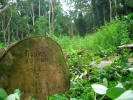 The 2010 Open Day was marked with the planting of indigenous trees by IITA staff in Ibadan, Nigerian second city, to help mitigate the effects of climate change and losses in biodiversity.
The 2010 Open Day was marked with the planting of indigenous trees by IITA staff in Ibadan, Nigerian second city, to help mitigate the effects of climate change and losses in biodiversity.
Indigenous forests in Africa are being cut down at an "alarming" rate of about 3.4 million hectares per year, making the continent the region with the second highest net annual loss of forests in 2000-2010, United Nation's Food and Agriculture Organization (FAO) has said.
Deforestation rate in Nigeria has reached a disturbing rate of 3.5% per year, translating to a loss of 350,000-400,000 hectares of forest per year. In 1976, Nigeria had 23 million hectares of forest but today only 9.6 million hectares remain, less than 10% of country's area.
At the 2010 Open Day, John Peacock, manager of the International Institute for Tropical Agriculture (IITA) explained that conservation and preservatio of Africa's surviving tropical forests and restoring of deforested areas could help reduce the severity of climate change.
Planting trees is part of a new initiative to restore rainforests in Nigeria, in coordination with the UN-REDD (Reducing Emissions from Deforestation and Forest Degradation) initiative in Nigeria. Statistics indicate that Nigeria's Milicia excelsa (iroko) has become endangered, with about $100 million worth of Iroko timber illegally poached from remaining forests last year.


